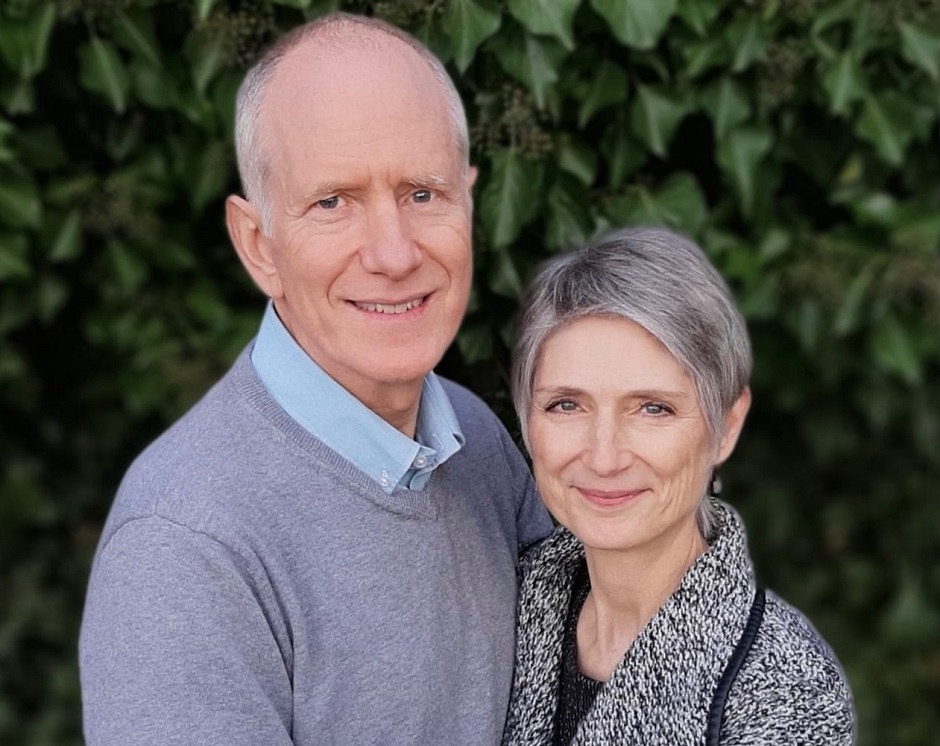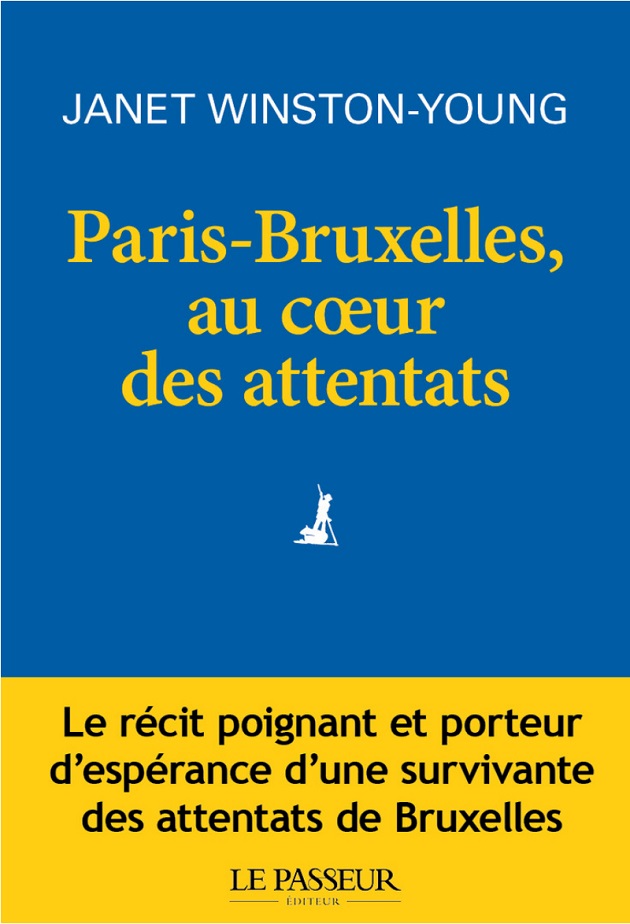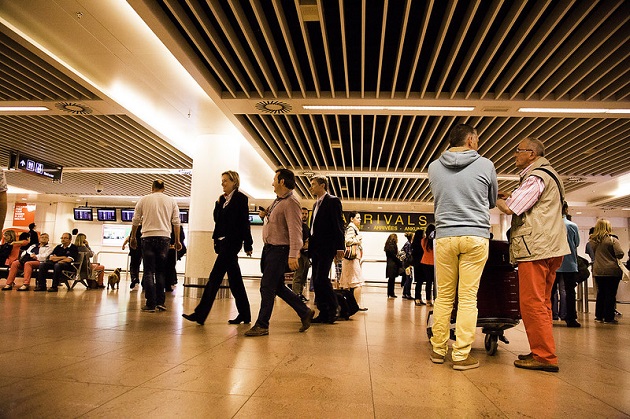“Even in the midst of the biggest nightmare, God gives a path to follow”
Janet Winston-Young and her husband survived the Brussels International Airport terrorist attack of 2016. She tells us her story of recovery and why she wrote a book about it. “I can say that God was with me in the hell of the bombing”.
BRUSSELS · 09 JUNE 2021 · 12:54 CET

On 22 March 2016, coordinated terrorist attacks in the Brussels International Airport and the metro system of the city took the lives of 32 people, and left over 300 injured.
The radical Islamist group caused what would be the worst attack in Belgium since World War II.
Among those who were injured was Janet Winston-Young, who has spoken to Evangelical Focus about her experience that day.
After a process of external and internal healing, she has now published a book in French titled Paris-Bruxelles, au cœur des attentats (Paris-Brussels, at the heart of the attacks, Publishing house: Le Passeur).
Listen to the audio version of this interview:
Question. Janet, that day in March 2016, you were at the Brussels-Zaventem airport with your husband when the first bomb exploded. What are your memories?
Answer. I was dropping my husband Fred off. He was going to the United States on a trip with young athletes. We were standing about 4 meters from the bomber when it exploded. I was facing the terrorist, so I saw the ball of fire come towards me. I heard a “Clap!”. Instantly I knew it was a bomb, but then we were knocked unconscious for several minutes, as it has been estimated.
At some point, after hearing the second bomb, I remember thinking: ‘I am dying now… it’s good’. As I thought I was dying, I felt utterly peaceful.
My husband later searched for me among the dead, the injured and the debris, and he helped me up. I remember looking around and seeing this desolation, and I thought to myself : ‘That is what the Bible means “The heart of men is bent towards evil” (Genesis 6: 5). For me, it was like the first piece of a puzzle falling into place.
I find it amazing that right away I had explanations in my mind coming from the Bible. Imagine if I had put my trust and hope in mankind, I would have panicked. It would have been devastating in a totally different manner.
Q. As the news emerged about the suicide bombings in the airport, in the media and social media there was panic and uncertainty. Back then, we were in a context in which several Islamist terror attacks had been happening in other places in Europe. What were your feelings in those first hours?
A. Both my husband and I had different injuries, but our hearing took the biggest hit. Fred has had five surgeries and we both wear hearing aids now. But that day, we were able to walk. We thought everyone around us was dead. We stepped out on the side walk. Later, some terribly injured people were left next to us on the sidewalk.
For the first hour and fifteen minutes we were there and cared for them, some of them were terribly injured. We waited for medical help. A woman I held a long time spent three years in the hospital. Another died right there, she was a mother of four.
I am a softy. Before, I fainted at a hospital while visiting an old lady when she had to do a blood test. But there, that day, I was able to keep my cool. I remember telling her: ‘Madame, Satan is evil, and men do terrible things, but God is good, you can turn to Him!’ I said that and then thought: ‘What are you doing, talking theology to this lady!’ But they were the right words. And saying it did me a lot of good. “…but God is good, you can turn to him!” That is such good news.
I received clear instructions to follow as I walked to help that young woman: ‘Hold them, talk to them, pray with them, and do not move them’. I realize now it was the Holy Spirit talking to me. These instructions helped me stay focused in this terrible situation as we waited for help to arrive. There were about eight or nine people there. That time spent on the sidewalk marked me the most in my recovery. It seemed like a never ending sidewalk.

Cover of the book Paris-Bruxelles, au cœur des attentats, by Janet Winston. Q. As you said, both your husband and you had hearing problems after the attack. But there is also the psychological trauma. How have you been recovering in these last five years?
A. Probably, one of the main reasons why I decided to write my testimony, is to share the difficulties traumas can bring, but especially how the Bible helped me make it through. Like anyone else with trauma, I was sometimes stuck in my head. My husband too, we were on different planets. He was trying to deal with his thoughts and emotions, and I was trying to deal with mine.
The thoughts and questions were pressing and we had difficulties concentrating. In such circumstances, your mind goes one hundred miles per hour but you can’t structure things or follow through anything. In addition your body can only move so fast, you are so very tired, body and soul.
Really, this is my testimony: the Word of God has been like a roadmap to me. It answered very clear questions or concerns and situations that stuck in mind. For instance, weeks after the bombing, I was rejoicing in the fact that despite having been faced with violence and death, I had felt peaceful. It was amazing ! But then this took another turn and became a negative thing: ‘why did I not just die? I would have been with the Lord and everything would have been fine’. But it was my daughter who cried out: “What about me, mum, what about us?” that made me realize it wasn’t a good thought. I had all these weird and contradicting emotions and did not know what to do with them.
One day, I was reading the Bible where Paul says: “To me, to die is gain”. And I thought, “Yes, this is how I feel now. I truly realize what this means, it’s good to be with the Lord, it’s not a bad thing.” But then Paul continues, and says: “But it is more important for you that I stay”. When I read those words, I got unstuck. I understood that those two thoughts were not contradictory. It would have been good to go with the Lord, but it is more important that I stay here. I have to live life fully. In his day, Paul was stoned by extremists and was left for dea. Just like we were left for dead by the firemen in the minutes following the bombing. I believe I experienced the same peace even in the face of death, and hence the same desire.
Really, I did get very concrete guidance and answers from the Word of God throughout my recovery. Answers for the weirdest thoughts and answers for very practical matters. For instance, how to deal with the insurance people, the lawyers, etc. What attitude to bring to the table. The Word of God is so relevant!
Q. Why would you recommend people to read your book - and the Bible?
A. I really wanted to tell my story so that anyone can read it, no matter if they believe in God or not, or have another religion. I wrote it like a story. I tell my story in the historical context of the terrorist attacks that were happening throughout Europe at the time. In the case of Brussels, the same group had engineered the November 2015 Paris attacks, hence the title of the book.
So, it can be read like a narrative, except that it is not fiction. And from the first to the last page, I weave the point of view of the Bible on things that helped me on the way to recovery.
I believe that Christians need to have a clear Biblical worldview. The big picture of the Bible story. The heart of the gospel, why Jesus had to die and why he rose again, only makes sense when it is placed in the bigger picture that the Bible tells from creation to Christ. I believe that a lot of believers today, just as other people in society, have pieces of worldviews all mixed in a bag but lack a cohesive worldview. The Bible also provides that for believers to be able to sustain life’s challenges and difficulties, traumas included.
I believe a person that is not a Christian would really be struck to discover how coherent the worldview of the Bible is. God’s point of view on us humans and our broken world brings much understanding and answers to humans’ basic questions.
So, I told my story in a way that is accessible to anyone. I tell it in the historical context of the events and also tell the Bible story that feeds the soul and answers big questions: Why is there evil in the world? Why is God not doing something about it? We often say: ‘You know, deep down, man is good’. But people (anybody, atheists, Christians) put their trust in men, and then they are hit with things they cannot explain. The Bible provides explanations that are meaningful and correspond to the realities of a broken world.
We were hindered by this terrorist attack. It took months and years out of us, it was very frustrating. But then, when I was able to gain some perspective, I realized… What a journey! The Bible is an amazing book, how interesting, how worth discovering!
The Bible truly is a fascinating book. There’s a reason why it is the bestseller of all times! I think it would benefit anybody to read it, regardless of whether they agree with it or not.
So, I thought: “Why not turn this terrible event into something that could get everyone talking about real and meaningful questions, questions that matter when we are faced with life… and death. Now, we face a pandemic. Tomorrow, who knows what? I thought it would be great if my book got people talking. Would it not be wonderful to find answers that satisfy the soul?

Archive image of the arrivals area of the Brussels Zaventem International Airport. / Photo: Antonio Ponte, Flickr, CC BY-NC-SA 2.0 Q. In Belgium and the rest of Europe, secularism is growing while other religions such as Islam and the Eastern spiritualities also have more influence. But not many of these worldviews have the concept of grace. Could you tell us a bit about your own journey of forgiveness?
A. I do not know if I can say that I forgave. The bomber died, so I do not know how I would react if I was to meet him. For a long time, maybe for two or three years, I hardly ever thought about him. I could never remember his name. To me he was nameless, as if he was a non-person. I met a police inspector that witnessed the massacre that day, and she told she could never hold on to the bomber’s name either. I think it is because what he did seems so unthinkable.
But something happened that got me moving on the road to forgiveness. One day, I was having lunch with a friend of mine, and she asked me: ‘If he was right there in front of you, what would you tell him?’ I just went blank! For a long time, I could not put a thought in my mind. And then, all of a sudden, I said: ‘God loves you’. I just wanted to swallow those words back! And then my body broke in a sweat.
Those words did not come from me. The Word of God drew a path for me on this issue and on many other ones. What do you do when you are overtaken by all kind of emotions? Anger, fear, sadness, frustration? You cannot deny these emotions because if you do, they will come back out with a vengeance. So, I acknowledged them. I would write them in my dairy as a prayer: ‘God, today I feel this or that’. Then I would read the Bible, often some psalms. They helped me put words on my emotions. But then, at some point you have to do something with those emotions, otherwise you become bitter and stuck.
One day, these famous words of Jesus were brought to my mind: “Love your enemies and pray for those who make you suffer”. It is making me emotional just to voice that verse now. I do not know if I can say that I love my enemies, but it got me started to pray for the terrorists that are still alive. I think that is how the Lord works with us. He knows how we function. I think at some point, we just have to obey what he says. Yes, the Lord is gentle with us. In Psalm 121, he is gentle with us like a mother. We can tell him our emotions, how we feel. But at some point, we have to start doing what the Bible tells us to do. I believe he then starts doing his work in our heart.
I guess that is my journey so far. And I think that it is where my future lies. I do feel that I have joy. Life is not easy. This event has made me more fragile. I am very transparent and do not pretend that we Christians are on a cloud playing the harp! But a Christian can be in the center of the fire or in the eye of the storm… and trust God and follow him one day at the time. He shows us the way out.
God knows what is good for us. He is light. Peter asked Jesus: “To whom shall we turn?” When anyone faces a terrible situation, the question is there: To whom shall I turn? Most people do not understand you, and probably those who can understand a bit what you are going through are those who share a traumatic experience. So, who can you turn to for real help? I discovered that the God of the Bible, who is a good God, patiently waits for us to turn to Him. “God is good, you can turn to him”, I told this lady on the sidewalk. Yes, God gives us a path to follow, He is the light even in the biggest nightmare.
One day, I felt borderline. I was so tired and at the end of my rope with this bombing thing. At night I was thinking: “Am I going to survive this?” Christians have an incredible advantage! They know God is light, not darkness. So even when we think we are going to fall apart, we know: ‘No, I’m going to be ok, I know the light’. Even if the worst possible thing could happen, even if I was to die, I know the God of light, and the light is at the end of the tunnel.
I can say that God was with me in the hell of the bombing. He accompanied me and showed me the way out.
Published in: Evangelical Focus - europe - “Even in the midst of the biggest nightmare, God gives a path to follow”
More News
Most read
Since you are here…
Evangelical Focus is a news and opinion platform that brings together Christians from across Europe and other parts of the world. We need the support of our readers to make this media project sustainable in the long term. You can support our work! Read about Evangelical Focus’s sustainability here.
Would you like to support the work of Evangelical Focus?
Use one of these methods. You can also transfer your donation to “Areópago Protestante / Evangelical Focus” IBAN: ES8521000853530200278394 (Swift / BIC: CAIXESBBXXX). Subject: “Donation Evangelical Focus”
